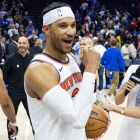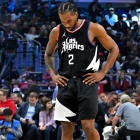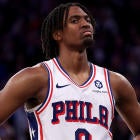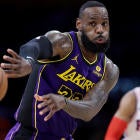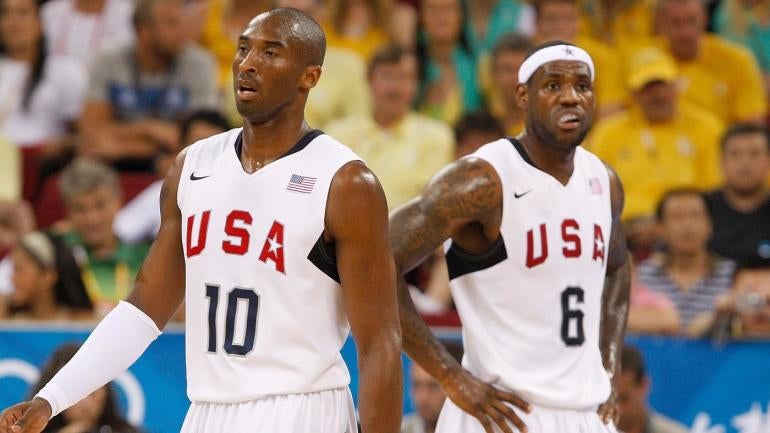
One of the great NBA disappointments is that we never got to see LeBron James and Kobe Bryant face off in a playoff series. It only could've happened in the Finals. By the time James got to the Western Conference, it was to replace the retired Bryant as the star of the Lakers.
But their legacies circled one another as probably the world's two best players for at least a half decade, and 2008 was right in the middle of that period. That's when LeBron and Kobe joined forces as the alphas of USA Basketball, anchoring the "Redeem Team" that was assembled to set the global-basketball-supremacy record straight after the U.S. left the 2004 Olympics in Greece with an embarrassing bronze medal.
What made the LeBron-Kobe union so interesting, and potentially so flammable, was the dichotomy between their styles of play. LeBron has always operated as part of a team. The best part, but a part nonetheless. Kobe often played like he was the team. LeBron thinks pass first. Kobe thought score first, and second, and sometimes third.
This clash of basketball ethos apparently came to a head in the lead-up to the Olympics.
In Ian O'Connor's recently-released book, "Coach K: The Rise and Reign of Mike Krzyzewski," a tense in-game moment is detailed in which LeBron, coming off the court, voiced his strong displeasure with Kobe's shot selection to Krzyzewski, who had been tabbed to coach the Olympic team and was reportedly treading lightly in his transition from coaching college kids -- whom he could command with total authority -- to the best grown-men players in the world.
Bryant, for one, enjoyed how Krzyzewski coached him. A lot of players were surprised that Kobe accepted the invitation to play for Team USA, given his standing around the league as a lone wolf. In that first team meeting in Las Vegas, Bryant sat at a table by himself, removed from his teammates, right behind the coaching staff. "It looked kind of weird," says McMillan.
Over time, Kobe felt reinvigorated by the unique challenge before him. He had been a pro for 10 years and appreciated the fact that Coach K was motivating him in a way that had nothing to do with money. But standards are standards, and suddenly on the night of Aug. 5, 2008, Bryant wasn't meeting Team USA's. He took a few loose shots in the second half against Australia—enough to draw the attention of his teammates. The U.S. won 87–76 but looked exceedingly beatable in doing so. The Americans were eager to get on with the Olympic tournament, and Kobe, apparently bored, seemed to be increasing the degree of difficulty on some attempts.
"Everyone knew it," says one Team USA staffer. "They know when another player is being selfish. Players can police themselves, but in this instance, as LeBron was coming out of the game, he said to Mike, 'Yo, Coach, you'd better fix that motherf-----,' as he walks by. He was talking about Kobe."
The Redeem Team was supposed to be all about accountability, and this was James holding Coach K and Bryant accountable. Krzyzewski told LeBron that he would talk to Kobe and asked that he trust him. The coaching staff met through the night. This time they talked only about how to handle Kobe.
The next morning, before leaving Shanghai, Krzyzewski asked Bryant, a three-time NBA champion with the Lakers, for a private meeting. "Coach was nervous," says one of his staffers. "He knew he had to do it."
Coach K pulled out a laptop and sat with Bryant in a room. He showed Kobe a few examples of questionable shots and pointed out his teammates standing around and watching him on some drives to the basket. Krzyzewski told Bryant to his face that these were "bulls--- shots." Coach K added: "There has to be more movement." And then he held his breath.
According to a team source, Bryant looked at Krzyzewski and said, "I got it, Coach. I got it. Don't worry about it. Sorry about that."
Krzyzewski told James that he'd followed up and confronted Bryant, and that Kobe was back on board with the program. Against the odds, the college coach had reached an accord with the NBA's biggest stars. "Kobe, LeBron and Coach K all did what they had to do," says one Team USA staffer. "It made going to Beijing a lot easier."
I love this story for so many reasons. One, it speaks to the hesitancy with which LeBron was operating as a leader at this juncture of his career. He hadn't won a title yet. Kobe was still the league's alpha. The LeBron we know now would've said something directly to Kobe, but that's what growing as a confident, secure leader is all about. LeBron wasn't quite there yet. It's understandable. You want to walk up to prime Kobe Bryant and tell him to stop jacking up shots? Heck, even Coach K was nervous to approach Bryant. Dude was a probably the most intimidating basketball player this side of Michael Jordan.
But Bryant was also humble and mature enough to accept Krzyzewski's criticism, and to actually apologize, assuring his coach that he would be better moving forward. That is a giant stepping stone for a coach, even one as experienced as Krzyzewski, to navigate a potential growing rift between the two best players in the world and come out with the full respect of both.
We know about Kobe the killer.
I love hearing about Kobe the willing, accountable teammate.
Truth is, Bryant could've puffed his chest up and told Krzyzewski to go to hell, and the man used to ruling college players wouldn't have been able to do much about it. What was he going to do, bench Kobe in his first run as the head coach of the Olympic team? You talk about alienating yourself as trying to be bigger than the best players in the world.
That team needed Kobe a lot more than it needed Coach K to win a gold medal. Coach K needed Bryant's cooperation. Bryant offered it willingly. He still had some games where he launched some questionable shots. But all's well that ends well, and the Americans indeed made good on their mission to reclaim official global basketball supremacy by beating Spain for the gold medal, and Kobe evolved over his Team USA career into the guy who took on the toughest defensive assignments and connected other elite scorers on the offensive end.














